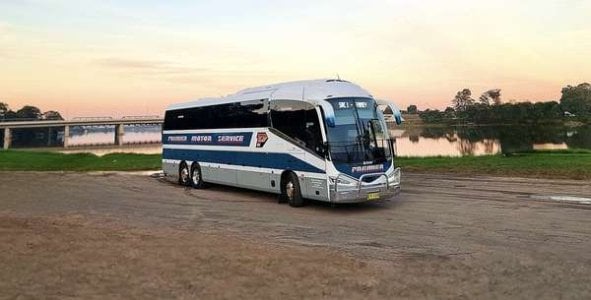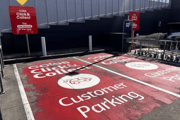Bus fares skyrocket 26 times from $2.50: ‘That’s incredibly expensive’
By
Seia Ibanez
- Replies 7
The recent decision by the Minns Labor government to cut regional bus subsidies has sent shockwaves through communities on the NSW north and south coasts, leaving many residents in a state of disbelief and distress.
The once-affordable bus fares have now soared from a mere $2.50 to an exorbitant $65 for a one-way trip on a busy route, putting a significant strain on the wallets of those who rely on public transport for their daily needs.
For individuals like Sue Muffler, a 75-year-old resident of Merimbula, the bus service was more than just a mode of transportation; it was a lifeline.
With over a dozen trips under her belt, Sue utilised the bus for essential activities such as medical appointments, trips to Sydney Airport, and the occasional indulgence in city life.

The 300-kilometre journey from her home to Bomaderry, which connects to the Intercity Trains Network, was not only affordable but also a stress-free alternative to the daunting drive or the costly flights from Merimbula to Sydney.
The sudden price hike has left Sue and many others in a state of shock and uncertainty.
‘There are a lot of people who can't afford to fly [from Merimbula to Sydney] because that's incredibly expensive,’ she said.
‘And driving, if you are not used to heading up that way, can be quite stressful, especially for older folk. Plus there's the cost of fuel.’
'I think that is just an incredibly huge amount that a lot of people won't be able to afford,' she lamented.
The question on everyone's mind is, what are the alternatives for those who cannot shoulder this financial burden?
The root of this drastic fare increase lies in the termination of a state government contract with Premier Motor Service, a privately-owned bus company that provided deregulated long-distance services along the NSW south and north coasts.
The routes affected include those from Bomaderry to Batemans Bay, Bega, Eden, and from Tweed Heads to Ballina and Lismore.
With over 28,000 passengers annually relying on the South Coast service, many of whom are concession card holders, the impact of this decision is far-reaching.
The company was blindsided by a notice from the state government, where the ‘funding agreement concluded on 31 May 2024, and no further funding will be paid in relation to the Eden-Bomaderry and Lismore-Tweed Heads service’.
Premier Motor Service expressed its shock and disappointment, and is currently seeking legal advice, unable to comment further on the matter.
Local politicians have not taken this development lightly. Independent Kiama MP Gareth Ward voiced his concerns in Parliament, urging the Premier to reconsider the decision.
‘Fares for a concession card holder travelling between Bomaderry in my electorate to the Far South Coast will increase from $2.50 to as high as $65 one way,’ he said.
‘In fact, they [Premier Motor Service] have been told they will have to absorb costs that came from the end of this agreement, [an agreement] that the provider just thought would continue. It's been an agreement in place for many, many years.’
‘Because of the increase in cost, this puts this service in jeopardy. It could become unviable.’
‘For South Coast locals, this is the only public transport service that runs from Bombaderry all the way to Eden,’ he added.
‘There is no train service, no metro, no light rail. This is a Sydney-centric bureaucracy that just doesn't understand what these cuts will mean.’
In response to the outcry, South Coast MP Liza Butler was ‘immensely concerned’, especially given the current cost of living crisis.
‘We are facing a cost of living crisis,’ she said in a statement.
She, along with Regional Transport and Roads Minister Jenny Aitchison, is committed to finding a solution to this pressing issue.
 Have you or someone you know been affected by these subsidy cuts and fare increases? How will this change impact your ability to travel and access essential services? Let us know your thoughts and experiences in the comments below.
Have you or someone you know been affected by these subsidy cuts and fare increases? How will this change impact your ability to travel and access essential services? Let us know your thoughts and experiences in the comments below.
The once-affordable bus fares have now soared from a mere $2.50 to an exorbitant $65 for a one-way trip on a busy route, putting a significant strain on the wallets of those who rely on public transport for their daily needs.
For individuals like Sue Muffler, a 75-year-old resident of Merimbula, the bus service was more than just a mode of transportation; it was a lifeline.
With over a dozen trips under her belt, Sue utilised the bus for essential activities such as medical appointments, trips to Sydney Airport, and the occasional indulgence in city life.

The Minns Labor government decided to cut bus subsidies, affecting several residents. Credit: Premier Motor Services
The 300-kilometre journey from her home to Bomaderry, which connects to the Intercity Trains Network, was not only affordable but also a stress-free alternative to the daunting drive or the costly flights from Merimbula to Sydney.
The sudden price hike has left Sue and many others in a state of shock and uncertainty.
‘There are a lot of people who can't afford to fly [from Merimbula to Sydney] because that's incredibly expensive,’ she said.
‘And driving, if you are not used to heading up that way, can be quite stressful, especially for older folk. Plus there's the cost of fuel.’
'I think that is just an incredibly huge amount that a lot of people won't be able to afford,' she lamented.
The question on everyone's mind is, what are the alternatives for those who cannot shoulder this financial burden?
The root of this drastic fare increase lies in the termination of a state government contract with Premier Motor Service, a privately-owned bus company that provided deregulated long-distance services along the NSW south and north coasts.
The routes affected include those from Bomaderry to Batemans Bay, Bega, Eden, and from Tweed Heads to Ballina and Lismore.
With over 28,000 passengers annually relying on the South Coast service, many of whom are concession card holders, the impact of this decision is far-reaching.
The company was blindsided by a notice from the state government, where the ‘funding agreement concluded on 31 May 2024, and no further funding will be paid in relation to the Eden-Bomaderry and Lismore-Tweed Heads service’.
Premier Motor Service expressed its shock and disappointment, and is currently seeking legal advice, unable to comment further on the matter.
Local politicians have not taken this development lightly. Independent Kiama MP Gareth Ward voiced his concerns in Parliament, urging the Premier to reconsider the decision.
‘Fares for a concession card holder travelling between Bomaderry in my electorate to the Far South Coast will increase from $2.50 to as high as $65 one way,’ he said.
‘In fact, they [Premier Motor Service] have been told they will have to absorb costs that came from the end of this agreement, [an agreement] that the provider just thought would continue. It's been an agreement in place for many, many years.’
‘Because of the increase in cost, this puts this service in jeopardy. It could become unviable.’
‘For South Coast locals, this is the only public transport service that runs from Bombaderry all the way to Eden,’ he added.
‘There is no train service, no metro, no light rail. This is a Sydney-centric bureaucracy that just doesn't understand what these cuts will mean.’
In response to the outcry, South Coast MP Liza Butler was ‘immensely concerned’, especially given the current cost of living crisis.
‘We are facing a cost of living crisis,’ she said in a statement.
She, along with Regional Transport and Roads Minister Jenny Aitchison, is committed to finding a solution to this pressing issue.
Key Takeaways
- The Minns Labor government has been criticised for ending regional bus subsidies on NSW's south and north coasts, affecting fares significantly.
- A 300-kilometre bus trip that previously cost $2.50 for concession card holders has increased to $65 due to the subsidy cut.
- Independent MP Gareth Ward and local residents are concerned about the impact of these cuts on affordable transportation for the community.
- Regional Transport and Roads Minister Jenny Aitchison is engaged in discussions to find a solution to the subsidy ending and the resulting fare increases.







